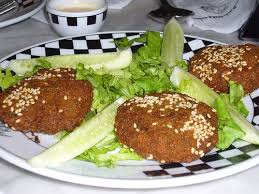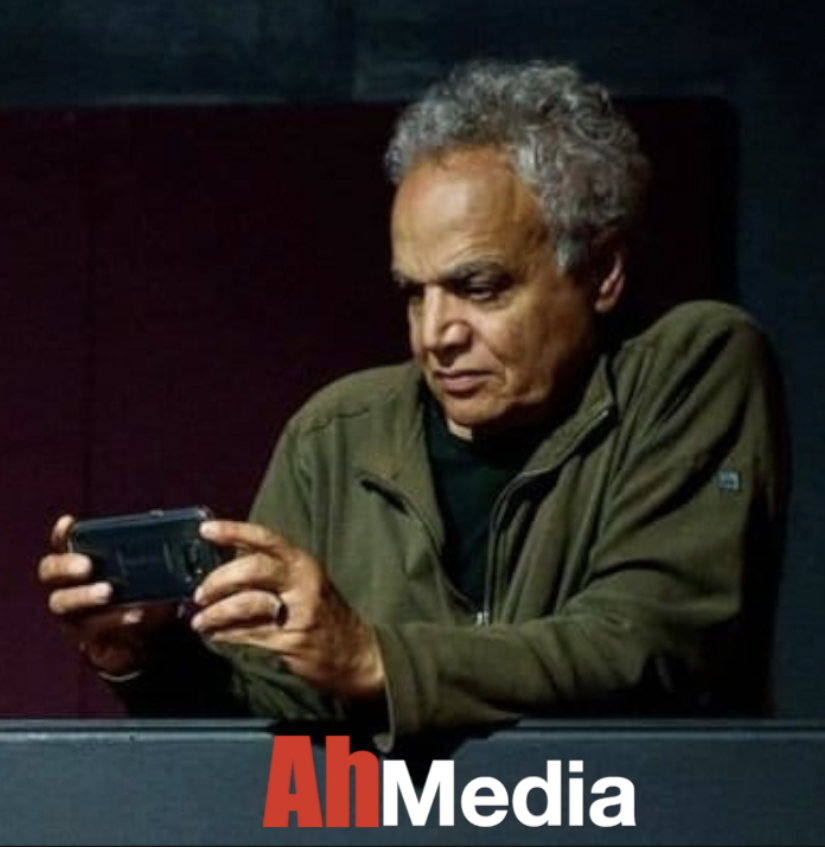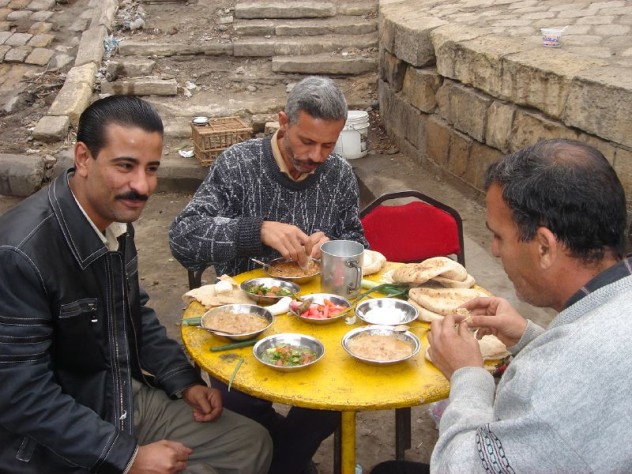The Falafel War
In my last flight to Paris, I was fortunate of sitting next to a young man who seemed cautious; with an excessive head turning motion. He seems like he is waiting for something to come or to happen. We avoided each other for a few thousand miles until I started playing an Arab movie on my laptop. It is dangerous behavior nowadays especially on airplanes. I was told not to bring anything hard or ethnic on the plane. I stopped ordering the special meal made for Muslim “hellal meal” with no pork. I will even eat pork if I have to.
The young man introduced himself as “I’m from Israel and we love to listen to Arabic music there.” We both started talking and we agreed on lots of things; and in the most part we kept politics out, you could say, we weren’t in our usual combative argumentative mood. Yes, the Jews had a rotten deal in history and they deserved a break. The Palestinians happened to be the victims of that break, and most Arabs would agree that: the Israelis are there and they need to live together with the Palestinians in peace side by side as long as they don’t take or bomb the Arab side.
We talked about families, living in the US and football (soccer;) and we started talking about food, “my favorite food is the Jewish Falafel” he swaggered. This is the first time that I heard of food having faith. As an Arab who grew up in Egypt, I have been eating falafel all my life, believing that falafel is just a Mediterranean food. Through history the Zionist founder fathers, knew it early on, to acquire the land of Palestine, you need also to appropriate its cultural; by claiming its food, music, and arts. All I’m saying is that Falafel is a regional food: Mediterranean food, made by the people who live there. Like Pizza is an Italian food not a Catholic food, Ooze is a Greek drink and not an Orthodoxy drink. So if you were an Arab Jew or a Jew who happened to live in the Mediterranean area along with Arabs and you made or ate Falafel; it is still a Mediterranean food, an ethnic food not a religious food. The problem I have nowadays with some fundamentalists Jews that they vehemently think that everything a Jew does, hears, or says is inherently Jewish. So if a few Jews had lived in Jerusalem 2000 years ago, now it is the promise land for millions of Jews around the world, mostly European Jews. Muslims around the world don’t claim Saudi Arabia, the birthplace of the prophet Muhammad as their promise land. We all know now what happened when some Muslims claim an Islamic state, the whole world is bombing the shit out of them even Muslims themselves.
Now, my defensive reflexive mechanism is gearing up. Hey, here is the deal my Israeli friend; I don’t care if you claim Palestinian land, water, or even olive trees: but you can’t claim my beloved falafel. Welcome to the falafel war. Everyone in the Middle East claims an authentic purity in their Falafel. Now the Israelis got into the falafel fray and as Min Liao’s stated in his piece Middle East Crisis, “Jews say that ancient Jews ate falafel in Egypt and Syria; and tourist brochures proclaim falafel to be “Israel’s national snack”. Arabs feel as if an important cultural recipe has been stolen and bastardized, and insist on falafel’s romantic Arab “roots”.

Even now, McDonalds is making falafel its own and is offering McFalafel in Egypt. Egyptians however will add a twist to Falafel, they call it Taamiah and make it with fava beans pronounced “foul”; and not from Garbanzo Beans (Chickpeas) as all other Arabs will make falafel. Food reflects the cultural and the values of the people making it and eating it. Falafel is the most democratic food in Egypt; it is eaten daily by all the Egyptians cutting through the rich and poor, young and old, women and men, Sisi supporters along with Brotherhood’s. I still believe, if there is any hope to put Egypt back together, Egyptians need to start a falafel conversation. Falafel breaks through all socio-economic classes, and for most Egyptians falafel along with foul, is the most reliable meal of the day; falafel shields Egyptians from the harsh daily life, or from any culinary assault like the one on that flight to Paris. Falafel is how Egyptians start their day. It is mostly eaten at breakfast where you can see people congregated around small street food cart enjoying communal meals in a harmony in the mist of street chaos and noises.
Falafel is a ethnic food, eaten mostly at breakfast where people want to start their day with familiar food. An Egyptian breakfast is typically a combination of Falafel, or Fava beans, feta cheese, and some kind of green, tomatoes, fresh onions, or cucumber; unlike the American breakfast, an Egyptian breakfast is a peaceful meal; where you don’t have to kill for bacon, or crack eggs to get your omelet.
My fellow Jews let my falafel go”
Ahmed Tharwat
Host/Producer of Arab American TV show Bel Ahdan with Ahmed
He Blogs at Notes from America WWW.ahmediatv.com
His articles appeared in national and international publications
You can follow him on
www.faceBook.com/ahmediatv , www.Twitter.com/ahmediatv
Read it in Other Publications



